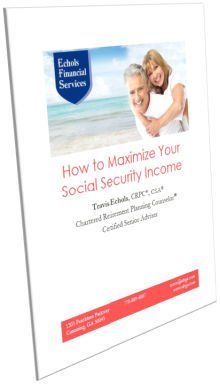Seven Common Retirement Mistakes to Avoid

Originally written on 12/13/2016.
Sign up to receive my monthly email articles on retirement planning and investments--no cost, no obligation
.
Millions of future retirees face a potential crisis some have called “the perfect storm”. Some of the challenges are:
- Living longer
- High taxes
- Unexpected early retirement
- High health care costs
- Inflation
- Reduced government and employer benefits
- Not enough savings
- Unsustainable withdrawal rates
- Not enough growth of savings
- Excessive market volatility
Managing these challenges takes careful planning. Here are seven common retirement mistakes that can sabotage your financial future.
- Failing to establish goals based on your core values . Failing to establish specific financial goals is a big mistake. Studies show that early planning is important to a more satisfying retirement. But even if you set detailed goals, if those goals are not aligned with your life goals, you may not end up with the life you want. Good planning starts with basic life questions such as, “What do I love to do so much that I would do it if nobody paid me to do it?” and “What are the most important dangers, opportunities, and strengths that I need to address?
- Not understanding your family members’ perspective on money . This is important because the number one cause of marital problems is finances. Attitudes toward money can also create stress between parents and children, siblings, in-laws, and cousins. Money should be viewed as a tool that aids us in living a life of purpose, harmony, and joy? So if money is interfering, attempt to understand the different ways you and your family members view money. Ask yourself, “Do I primarily view money as success, security, love, or acceptance? How does my spouse view money?” Understanding each other’s perspectives and working together can make a family stronger.
- Not knowing your financial freedom number . What is your financial freedom number? This is your monthly after-tax, inflation-adjusted income you will need in retirement to meet all your expenses. (You can either add up all expenses or back into it by assessing how much you currently earn and how much of that amount you either save or fall short.) With that number in mind, what inflation-adjusted income do you need in addition to Social Security, pensions, rental income, etc? Now, with that monthly income number, what amount of capital is needed to produce that level of after-tax income throughout your life, while still meeting any other goals, such as long term care and leaving an inheritance? You can now create mini-goals in today’s dollars that can be assessed annually. When that amount of capital is obtained, you can retire--and it could be earlier than you think. This knowledge can also prevent you from running out of money or living too meagerly.
- Failing to maximize your Social Security benefits . Making the right decision about Social Security starts with knowing how your Social Security benefit is calculated, and then planning ahead to discover which Social Security claiming strategy is best for you, and managing the associated taxes. Social Security continues to be the largest source of income for most retired Americans. So it is critical to make the right decisions here. Social Security may be your best and only way of receiving an inflation-adjusted, guaranteed-for-life income that is not susceptible to longevity risk and investment risks. See How to Maximize Your Future Social Security Payments.
- Having a poor investment strategy . Most people cannot save enough to sustain a comparable standard of living throughout a 20 to 30 year retirement. So it is important to invest those savings in a way that your retirement nest-egg grows without excessive risk. The wrong investments and investment behavior can jeopardize your life goals (settling for low returns that can’t outpace inflation, taking too much risk, under-diversifying, paying too much in taxes, reacting to short-term market movements, chasing returns, mismatching assets in the wrong type of accounts, etc.).
- Having a sloppy investment harvesting plan . In retirement, a poorly-structured plan to withdraw money from your nest-egg can be devastating. When a paycheck is no longer coming in, you have to structure your investments to provide an inflation-adjusted income for your entire life. This is needed in retirement because the wrong income distribution strategy may not meet critical goals such as reliable income for your entire life, growth to combat inflation, assets available for emergencies, and protection from excessive market fluctuations. A good plan allows you to live off your nest-egg without running out of money or cheating yourself out of a more enjoyable lifestyle. See Investing for Income in Retirement.
- Failing to plan for tax control in retirement . It often makes sense to defer taxes to a time in life when your tax rate will likely be lower. So individuals and employers often pile money into tax-deferred retirement accounts. The problem with this strategy comes when it is time to retire. If all the income you need from your investments must come from pre-tax accounts such as IRAs and 401(k)s, the combined taxes of pensions, investment distributions, and Social Security can be staggering. To avoid this "tax torpedo", it is necessary to plan now for more tax control later. Ask yourself, “What tax strategies am I using now that will give me more tax control later and make my money go further during retirement?” See How to Maximize the Roth IRA to Your Tax Advantage.


Travis Echols , CRPC®, CSA
Receive free Social Security Guide by email




Investment Advisory Services offered through JT Stratford, LLC. JT Stratford, LLC and Echols Financial Services, LLC are separate entities.











